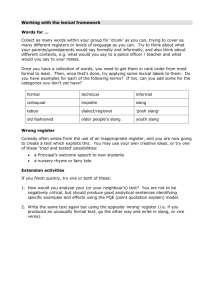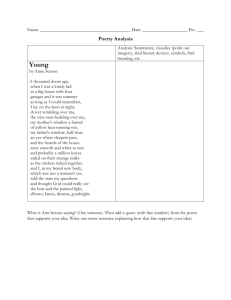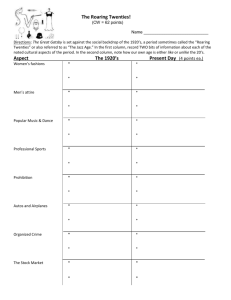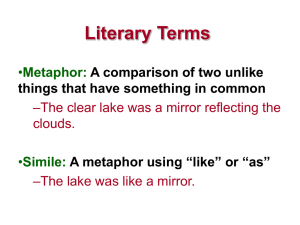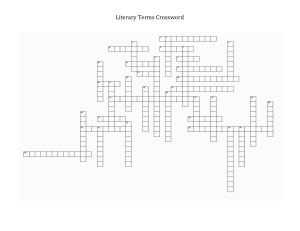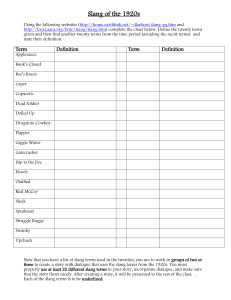Literary Devices & Figurative Language
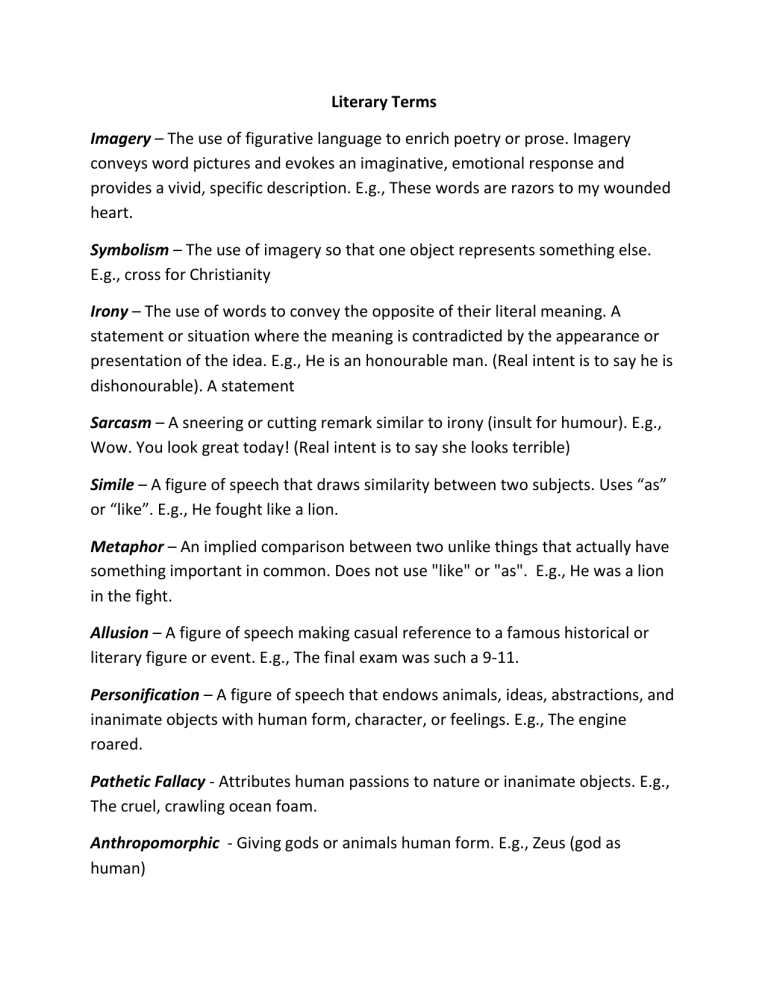
Literary Terms
Imagery – The use of figurative language to enrich poetry or prose. Imagery conveys word pictures and evokes an imaginative, emotional response and provides a vivid, specific description. E.g., These words are razors to my wounded heart.
Symbolism – The use of imagery so that one object represents something else.
E.g., cross for Christianity
Irony – The use of words to convey the opposite of their literal meaning. A statement or situation where the meaning is contradicted by the appearance or presentation of the idea. E.g., He is an honourable man. (Real intent is to say he is dishonourable). A statement
Sarcasm – A sneering or cutting remark similar to irony (insult for humour). E.g.,
Wow. You look great today! (Real intent is to say she looks terrible)
Simile – A figure of speech that draws similarity between two subjects. Uses “as” or “like”. E.g., He fought like a lion.
Metaphor – An implied comparison between two unlike things that actually have something important in common. Does not use "like" or "as". E.g., He was a lion in the fight.
Allusion – A figure of speech making casual reference to a famous historical or literary figure or event. E.g., The final exam was such a 9-11.
Personification – A figure of speech that endows animals, ideas, abstractions, and inanimate objects with human form, character, or feelings. E.g., The engine roared.
Pathetic Fallacy - Attributes human passions to nature or inanimate objects. E.g.,
The cruel, crawling ocean foam.
Anthropomorphic - Giving gods or animals human form. E.g., Zeus (god as human)
Alliteration - Repetition of the initial letter or sound in two or more closely associated words. E.g., The Wicked Witch of the West went on her way.
Assonance – Similarity in sound between vowels in two or more syllables. E.g., love and dove; fate and lake
Consonance – The repetition at the end of words with identical consonant sounds. E.g., shallow and yellow; click and flock; sing and song
Anaphora - The repetition of the same word or phrase at the beginning of successive clauses or verses.
Cacophony - A harsh, unpleasant combination of sounds or tones; a disagreeable sound effect. E.g., A toad the power mower caught, Chewed and clipped of a leg, with a hobbling hop has got ["The Death of a Toad" by Richard Wilbur]
Stream of Consciousness – Focus is placed on the mind and thoughts of the central character to give a psychological effect. Character’s thoughts are set down in a long, rambling dialogue called Interior Monologue.
Pun – A play on words based on a similar word or similar-sounding word used to suggest two or more possible meanings. E.g., They went and told the sexton, and the sexton tolled the bell. E.g., Santa’s helpers are known as subordinate clauses.
Idiom – An expression that doesn’t literally mean what it says. E.g., Lend a hand;
I’m all ears.
Hyperbole – A figure of speech based on exaggeration. It secures attention and gives emphasis. E.g., He was so thirsty, he drank 1000 litres of water.
Analogy – Helps to establish a relationship based on similarities between two concepts or ideas. It conveys a new idea by using the blueprint of an old one in order to lead to understanding. E.g., In the same way as one cannot have the rainbow without the rain, one cannot achieve success without hard work.
Euphemism – Mentioning a disagreeable idea in an agreeable manner. E.g.,
passed on instead of died
Dysphemism - A term that emphasizes a defect or failing; the opposite of euphemism. E.g., "It's going to be a slushy, sloppy day".
Cliché - From the French word for a stereotype plate which is block for printing.
Any expression used so often that its freshness and clarity are outworn. E.g.,
Laughter is the best medicine, every cloud has a silver lining, what goes around comes around.
Flashback – The depiction of certain events that have taken place before the present time of the narration. E.g., through reflection, dreams, memories
Foreshadowing – The use of words/phrases and hints that give the reader a hint of something that is going to happen without revealing the story or spoiling the suspense.
Connotation – Where the intended meaning is not stated clearly. Reader has to decode.
Denotation – Expressing meaning or significance in a straightforward manner.
Onomatopoeia – The use of words that are suggested by the sound. E.g., Hiss; buzz; gurgle
Oxymoron – A phrase bringing together two contradictory terms. E.g., wise fool; sad joy; the sound of silence
Suspense – An expected uncertainty concerning the outcome of the plot. Used to hold the reader’s interest
Mood – The tone in any work of literature, drama, art, or music. E.g., fearful; serene; suspenseful
Tone – A term that denotes the mood in a piece of writing. The total effect of word sounds and associations sets the tone. E.g., Short sentences to show excitement and action; long sentences to show slow movement; colours used to associate with emotions
Antithesis - The juxtaposition of contrasting ideas in balanced phrases. E.g., It was the best of times; it was the worst of times. You’re easy on the eyes; hard on the heart.
Vernacular - The domestic or native language of the people of a particular country or geographical area.
Slang - Vernacular speech, not accepted as literary, although used in conversation and colloquial expression. Often, slang develops as a short cut of expression. Also, special terms are developed in professions or trades, sports, special localities, and groups sharing a common interest. Sup; tight, beezer = nose in boxing; peckerhead, cowboy, fish bit for electricians.
Colloquialism - An expression used in general conversation but not accepted in formal writing. It's between upper level language and slang. E.g., you’re; gonna; wanna. (Not all are slang. Some are just specific to geographic regions such as soft drink vs. soda vs. pop).
Jargon - Confused, meaningless speech or language used by specific groups.
Mostly used by professionals. To confuse or show intellect. Used in medicine, law, sports, religion, etc.. BP = blood pressure; Code Eight – officer needs help immediately; depo = deposition.
Dialect - A variety of spoken language peculiar to geographical region or community.
Catharsis - Aristotle described the effect of tragedy as a catharsis (literally, purging) of the spectator's emotions. Pity and fear purify these emotions. This term commonly denotes the purification of the emotions through the spectator's imaginative participation in the sufferings of the tragedy's characters.

